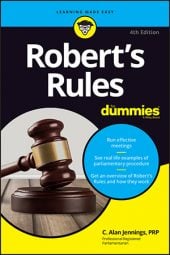You can still read the minutes aloud to the members in the meeting, if you want to, but if time is precious, distribute the draft of the minutes in advance.
Because changes may be made in the minutes before they’re approved, it’s good practice for the secretary to note somewhere on the distribution copy that it’s a “draft for approval” at the next regular meeting.
Members who make notes of any corrections to meeting minutes are able to keep accurate records if they keep their copies of the draft minutes on file or if a final version isn’t automatically distributed to them at a later date.Handling the motion for approval
The most efficient way of approving minutes is for the chair to assume the motion and obtain unanimous consent that the minutes be approved as distributed (or as corrected).The presiding officer says, “The minutes have been read (or distributed) to you. Are there any corrections?” If corrections are offered, the chair handles each by offering the correction to the membership, just to be sure everyone agrees that the correction is accurate. The secretary then enters the corrections on the master copy.
When no (further) corrections are offered, the presiding officer says, “If there are no (further) corrections . . . (pause) . . . the minutes are approved as read/distributed/corrected.”
It’s never in order for a member to simply object to the approval of minutes. If a member has some objection to the content of the minutes, he must offer a correction. If disagreement arises about the correction, the correction can be amended using the rules for amendments.
Approving minutes by committee
If the assembly isn’t meeting again for a long time (if at all), such as in annual membership meetings or conventions of delegates, the process of approving the minutes is delegated to a special committee or an executive board. This practice produces an approved and legal record of the meeting shortly after the meeting closes but before memories of what occurred in the meeting fade.If yours is a group that customarily deals with minutes by a motion to “dispense with the reading of the minutes,” you need to make a change. Your intent is probably to approve them with that motion, but you don’t actually approve anything. You just agree not to read them.
If you want to use the term dispense in your meeting, let it be to “dispense with the reading of the minutes and approve them as distributed/printed.”
